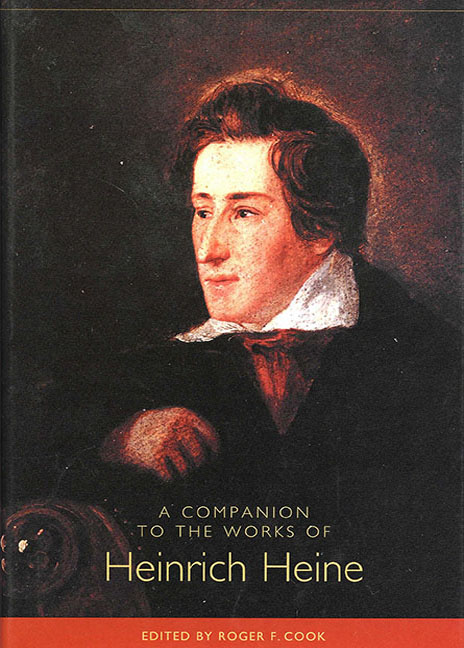Book contents
- Frontmatter
- Contents
- Acknowledgments
- Chronology of Heine's Life
- Heine's Major Works
- List of Abbreviations
- Introduction
- The Romantic Poet
- Philosophy, History, Mythology
- Religion, Assimilation, and Jewish Culture
- Modernity: Views from the Poet's Crypt
- Mathilde's Interruption: Archetypes of Modernity in Heine's Later Poetry
- Late Thoughts: Reconsiderations from the “Matratzengruft”
- Reception in Germany
- Notes on the Contributors
- Index
Mathilde's Interruption: Archetypes of Modernity in Heine's Later Poetry
from Modernity: Views from the Poet's Crypt
Published online by Cambridge University Press: 29 July 2017
- Frontmatter
- Contents
- Acknowledgments
- Chronology of Heine's Life
- Heine's Major Works
- List of Abbreviations
- Introduction
- The Romantic Poet
- Philosophy, History, Mythology
- Religion, Assimilation, and Jewish Culture
- Modernity: Views from the Poet's Crypt
- Mathilde's Interruption: Archetypes of Modernity in Heine's Later Poetry
- Late Thoughts: Reconsiderations from the “Matratzengruft”
- Reception in Germany
- Notes on the Contributors
- Index
Summary
I. Heine in the Passagen
In his centenary lecture in 1956 Adorno tried to fix Heine's historical position by way of a comparison with Baudelaire. In this view, by being subjected to the processes of reproduction in the literary sphere, Heine was brought into direct contact with the most modern currents of the nineteenth century — “Damit ragt Heine in die Moderne des neunzehnten Jahrhunderts hinein gleich Baudelaire,”but while Baudelaire heroically extracts his imagery from the increasingly corrosive experience of modernity, transfiguring the loss of all images into itself an image, Heine apparently, in his own historical moment, was unable to develop sufficient resistance to the onward march of capitalism. He applies techniques of industrial reproduction to an inherited repertoire of Romantic archetypes, but the other modernity — the modernity of the city — is reserved for Baudelaire. Even though Baudelaire was six in the year Buch der Lieder appeared, Heine's claim to have inaugurated modern poetry was made only three years before the publication of Les fleurs du mal, and many of the earlier poems in Baudelaire's cycles date from the 1840s or even earlier. Since Heine had been in Paris with only brief interruptions from 1831, his experience of Paris life and of the social formations of the July Monarchy, the Second Republic, and the Second Empire was not radically different from that of the younger poet.
Adorno's notion of modern archetypes almost certainly derives from his knowledge of Benjamin's Passagen project, although neither critic knew much of Heine's work beyond Buch der Lieder. Indeed Benjamin began to consider Heine only because of Baudelaire's sympathetic interest in him. In a 1935 letter, Adorno suggested to Benjamin that Heine might be expected to provide further evidence of the process of commodification (Adorno and Benjamin 145–46); and he made one further suggestion by sending two stanzas from the Romanzero poem “Jehuda ben Halevy” because they allude to a number of issues important to Benjamin:
Der Jehuda ben Halevy,
Meinte sie, der sei hinlänglich
Ehrenvoll bewahrt in einem
Schönen Futteral von Pappe
Mit chinesisch eleganten
Arabesken, wie die hübschen
Bonbonnieren von Marquis
Im Passage Panorama. (B 6.1: 149)
Benjamin's reply is both excited and aggrieved. Adorno would never have found these lines, he suggests, had he not been guided by Benjamin's work on the Paris arcades and by the themes of his 1935 sketch (Adorno and Benjamin 135).
- Type
- Chapter
- Information
- A Companion to the Works of Heinrich Heine , pp. 285 - 314Publisher: Boydell & BrewerPrint publication year: 2002



